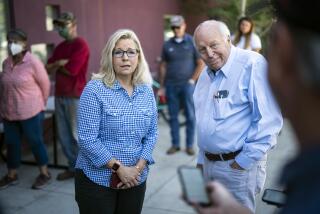‘In Its Last Throes’? Cheney Admits It Wasn’t
- Share via
WASHINGTON — Vice President Dick Cheney on Sunday defended his lightning-rod role as a leading advocate for invading Iraq, for a warrantless surveillance program and for harsh treatment of suspected terrorists.
“Part of my job is to think about the unthinkable, to focus upon what in fact the terrorists may have in store for us,” Cheney told NBC’s “Meet the Press” when asked about his “dark side.”
Cheney now recognizes, he said, that the insurgency in Iraq was not “in its last throes,” as he said in May 2005. “I think there is no question but that we did not anticipate an insurgency that would last this long,” the vice president said.
“It’s still difficult. Obviously, major, major work to do is ahead of us. But the fact is, the world is better off today with Saddam Hussein out of power. Think where we’d be if he was still there,” Cheney said during the hourlong interview.
Cheney shrugged off news reports that his influence was waning, supposedly because of foreign policy miscalculations and because other advisors, especially Secretary of State Condoleezza Rice, were getting more attention from President Bush.
The vice president said the reports were about as valid “as the ones that said I was in charge of everything.”
Cheney challenged polls suggesting that a majority of people in the United States do not believe the Bush administration’s claim that the war in Iraq is the central front in the fight against terrorism.
He said the U.S. had done a good job on “homeland security, in terms of the Terrorist Surveillance Program we put in place, the financial tracking we put in place, and because of our detainee policy.”
Asked if the U.S. still would have invaded Iraq had the CIA told Bush and him that Iraq had no weapons of mass destruction in 2003, Cheney answered yes. He said Iraq had the capability of obtaining such weapons and would have done so once U.N. penalties were eased.
Cheney said he still disagreed with the Supreme Court’s decision in June that the administration had overstepped its authority in holding suspected terrorists without trials or Geneva Conventions protections. He declined to discuss specific treatment of detainees, but said information gleaned from interrogations “helped us prevent attacks against the United States.”
More to Read
Sign up for Essential California
The most important California stories and recommendations in your inbox every morning.
You may occasionally receive promotional content from the Los Angeles Times.













